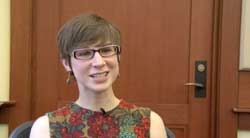Filed Under > Convocation
The (Therapeutic) Value of Being Heard
Gillian Esquivia-Cohen has studied the use of biblio-therapy for traumatized immigrant children
Gillian Esquivia-Cohen has studied the use of biblio-therapy for traumatized immigrant children
By Patricia Lamiell
As the only Jewish child in her school in tiny North Scituate, Rhode Island, Gillian Esquivia-Cohen, who is receiving a master’s degree in Bilingual and Bicultural Education, encountered anti-Semitism severe enough that she ended up transferred to another school in a different town. On the positive side, however, she emerged with a deep appreciation for the importance of recognizing children’s ethnic and cultural traditions.
That awareness crystallized into a sense of calling when, as an undergraduate at Boston University, Esquivia-Cohen, who had learned Spanish conversing with co-workers at her job in the university cafeteria, began tutoring Spanish-speaking immigrant children in Boston schools, where bilingual education had been banned. Third-graders would come to her with backpacks stuffed full of incomplete assignments and notes from teachers at their wits’ end. “Juan cannot speak English,” the notes would say. “I cannot teach him.”
Esquivia-Cohen, who had been contemplating a career in medicine, decided then and there to become a teacher and focus on immigrant children. She became even more committed to that choice after marrying a Colombian and working in Colombia with families in the northern part of the country who had been displaced by violent conflict in their own communities. Later, working with immigrant children in New York City, Esquivia-Cohen would recognize behaviors and reactions that mirrored those of internationally displaced children in Colombia.
Since coming to New York, Esquivia-Cohen has researched, learned and implemented a therapeutic technique called biblio-therapy, which calls for children to read specially selected, high-quality books in their native language that tell stories of traumatic events similar to those they have experienced. The children are encouraged to talk first about the characters in these books, and then, if they are able, about themselves. Biblio-therapy holds that traumatized immigrant children cannot learn until they have been able to share their experiences in their own language, with someone whom they can trust.
At Teachers College, working with Patricia Martinez-Alvarez, a visiting professor of International and Transcultural Studies, Esquivia-Cohen has written her master’s degree thesis on her use of biblio-therapy with children in the Harlem classroom where she served as a student teacher. Following graduation, she will return to Colombia – this time to Bogota -- to continue her research and to work again with Colombian social workers and children displaced by the war. After that, she would like to move back to Rhode Island to work as a classroom teacher with immigrant children in the Providence area, where there is “real dearth of Spanish-speaking educators” despite a big increase in the number of Latino immigrants.
“I want to work in the classroom, because I believe the great changes in our society will be enacted on the ground,” she said. “And that ground is with children in schools.”
Published Monday, May. 14, 2012
